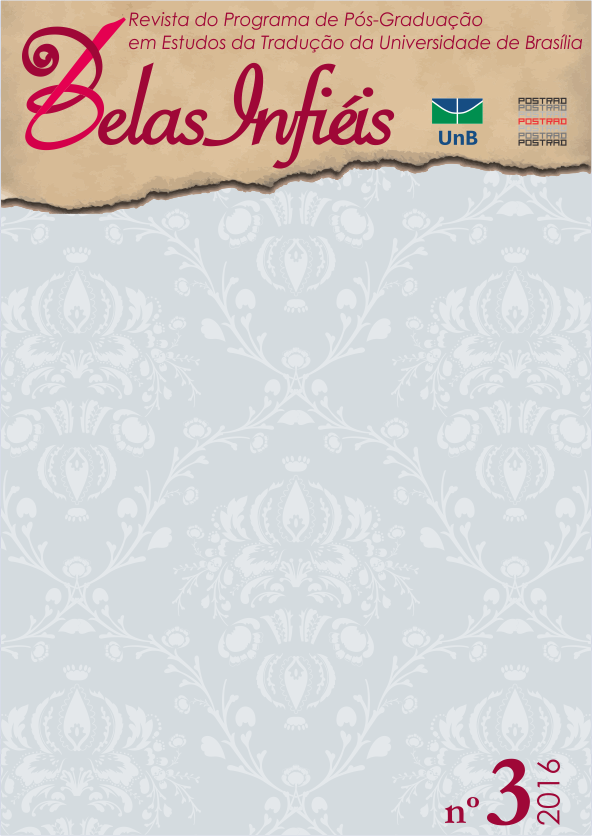TRADUÇÃO COMENTADA DO ATO III DA PEÇA SAVAGES, DE CHRISTOPHER HAMPTON, 1974:
LITERATURA TRADUZIDA COMO REMINISCÊNCIA HISTÓRICA
DOI:
https://doi.org/10.26512/belasinfieis.v5.n3.2016.11410Palabras clave:
Tradução Comentada, Selvagens, Christopher HamptonResumen
Ainda que, todavia, resista muita discussão sobre o suposto antagonismo domesticar vs. estrangeirizar (VENUTI, 2002), é importante ter em mente que muito das escolhas do tradutor dependem diretamente do seu escopo, além do tempo, do espaço e do contexto do público receptor ”“ ou seja, depende por completo do seu projeto de tradução (NORD, 1997, p. 49). Na minha tradução do terceiro ato da peça Savages, escrita em 1973 pelo dramaturgo inglês Christopher Hampton, optei por um caminho que, pode-se dizer, me coloca entre o domesticador e o estrangeirizante. Já que não tenho restrições quanto ao meio textual (NORD, 1997, p. 50) ou aos possíveis receptores do texto (atores e leitores), em vez de limitar minhas escolhas visando a uma narrativa que devesse necessariamente ser encenada, ou apenas lida, não privilegio nenhum desses caminhos particularmente ”“ tento, ao invés disso, seguir ambos ao mesmo tempo.
Descargas
Citas
HAMPTON, Christopher. Savages. UK, London: Faber & Faber, 1974.
NORD, Christiane. “Defining Translation Functions: The translation brief as a guideline for the trainee translator”. Ilha do Desterro (Brasilien), Special Issue Translation Studies in Germany, Florianopólis, ed. Wolfgang Lörscher, 2.1997, 39-53.
VENUTI, Lawrence. Escândalos da Tradução. Tradução: Laureano Pelegri. São Paulo: EDUSC, 2002.
Descargas
Publicado
Cómo citar
Número
Sección
Licencia
Copyright Statement
Given the public access to this journal, the texts are free to use but requires the recognition of the original authorship and initial publication in this journal to be properly stated.
The journal allows the use of works published for non-commercial purposes, including the right to submit the work to publicly accessible databases. Published contributions are the sole and exclusive responsibility of the author(s).
- When submitting papers to be evaluated by the Belas Infiéis journal, the author(s):
- Declare that the contents of the contributions are original and of their original creation, being entirely responsible for their content if there is an objection by third parties.
- Claim to be aware that they should not commit academic plagiarism.
- Declare that the manuscript has not been published, completely or partially, in Portuguese or another language. If it is a translation it should be submitted to the Translated Articles section.
- Declare that the manuscript is not being evaluated by other journals.
- Declare that the manuscript was not submitted to another journal simultaneously.
- Commit(s) to inform the journal of any kind of error or inaccuracy in their contribution (published, in evaluation or in editing) and to collaborate with the editors to make due corrections of the article (when in evaluation or editing) or erratum/retraction (after publication).
- Declare that there is no conflict of interest regarding the published work.
- Authorize its release if it is accepted for publication without any kind of monetary compensation.
- Agree to assign non-exclusive rights to publication to the magazine, remaining free to make their contribution available in other media as long as the publication of the first version in Belas Infiéis magazine is mentioned. They also authorize Belas Infiéis to assign their texts for reproduction in content indexers, virtual libraries and similar platforms.
- Maintain copyright and grant the journal the right of first publication, the work being licensed under theCreative Commons Attribution License.
- Is/Are allowed and encouraged to publish and distribute their work online after the editorial process, which may increase the impact and citation of the published work.
- Authorize the editorial team to make textual adjustments and to adapt the article to the publication rules, when necessary.



















